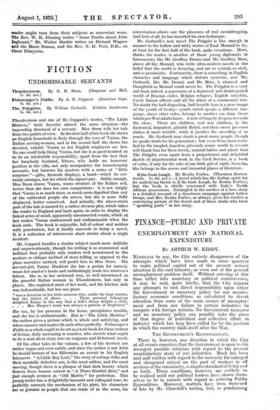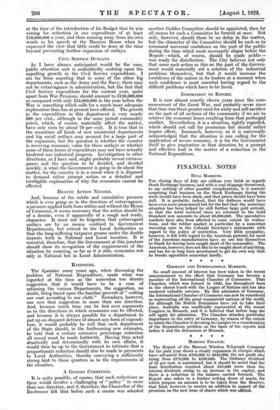FINANCE-PUBLIC In PRIVATE
UNEMPLOYMENT AND NATIONAL EXPENDITURE
BY ARTHUR W. KIDDY.
NEEDLESS to say, the City entirely disapproves of the attempts which have been made in some quarters to make political capital out of the present serious situation in the coal industry, or even out of the general unemployment problem itself. Without entering at this time either into monetary or political controversies, it may be said, quite briefly, that the City regards any attempts to cast direct responsibility upon either the Government or monetary policy for our unsatis- factory economic conditions as calculated to divert attention from some of the main causes of unemploy- ment and from our failure in certain industries to compete with foreign nations. No Government measures and no monetary policy can possibly take the place of that degree of individual and collective effort in industry which has long been called for by the position in which the country finds itself after the War.
Tim GOVERNMENT'S RESPONSIBILITY.
There is, however, one direction in which the City at all events considers that the Government is open to the strongest possible criticism with regard to the present unsatisfactory state of our industries. Much has been said and written with regard to the necessity for enlarged and cheapened output on the part of workers in all sections of the community, a simpler standard of living and so forth. Those conditions, however, are unlikely to be realised -until our political leaders have shown them- selves to be in earnest- with regard to reducing Publio Expenditure. Moreover, matters have been worsened of late by Mr. Churchill's tactics, first, in proclaiming at the time of the introduction of his Budget that he was aiming for reduction , in our expenditure of at least £10,000,000 a year; and then running away from his own words in his speech at the Mansion House when he expressed the view that little could be done at the time beyond preventing further expansion of outlays.
CIVIL SERVICE OUTLAYS. • - As I have always anticipated would be' the case, public attention now is undoubtedly centring upon the appalling growth in the Civil Service expenditure. I am far from asserting that in some :of:the other big departments, such as the Army and the Navy, there may not be extravagance in administration, but the fact that Civil Service expenditure for the current year, quite apart from War Pensions should amount to £156,000,000 as compared with only £:54,000,000 in the year before the War is sojnething which calls for a much more adequate explanation than has at present been offered. The growth in the expenditure in this department is very nearly 800 per cent., although in the same period commodity prices, which, of course, materially affect the matter, have only risen by about 70 per cent. It is true that in the meantime all kinds of new ministerial departments and big social outlays may account for a large part of the expansion, but the question is whether the country is receiving economic value for these outlays or whether some of these forms of expenditure may not have actually hindered our industrial progress. Investigation in other directions, as I have said, might probably reveal extrava- gance, and the question to be decided, and decided quickly, is what the Government is going to do about the matter, for the country is in a mood when it is disposed to demand either prompt action or a detailed and intelligible explanation of why the economies cannot be effected.
DRASTIC ACTION NEEDED.
And, because of the subtle and cumulative pressure which is ever going on in the direction of extravagance, a pressure applied both from within and without the House of Commons, it seems necessary that the action should be of a drastic, even if apparently of a rough and ready, character. It must not be forgotten that extravagant outlays are by no means confined to Government Departments, but extend to the Local Authorities so that the long-suffering taxpayer groans under the double imposts both in National and Local taxation. It is essential, therefore, that the Government at this juncture should show its recognition of the requirements of the situation by ensuring, so far as it is able, economies not only in National but in Local Administration.
RATifuaNa.
The Spectator some years ago, when discussing the problem of National Expenditure, made what was regarded at the time as the somewhat too drastic suggestion that it would have to be a case of rationing the various Departments, the suggestion, no doubt, being based upon the familiar proverb of" cutting our coat according to our cloth." Nowadays, however, one sees that suggestion in more than one direction. And, because much time can be lost over arguments is to the directions in which economies can be effected, and because it is always possible for a department to put up an eloquent defence of almost any form of expendi- ture, it would probably be well that each department of the State should, in the forthcoming new estimates, be told that a certain extensive percentage reduction all round must be made forthwith. Having thus acted drastically and determinedly with its own affairs, it -would then be up to the Government to intimate that a proportionate reduction should also be made in payments to local Authorities, thereby conveying a sufficiently strong hint to those quarters as to the requirements of the situation.
A GEDDES COMMITTEE.
It is quite possible, of course, that such reductions as ttkese would involve a challenging of " policy " in more than One direction, and if, therefore, the Chancellor of the Exchequer felt that before such a course was adopted another Geddes Committee should be appointed, then by all means let such a Committee be formed at once. Not only, however, should there be no delay in the matter, but the character of the Committee Should be such as to command universal confidence on the part of the public during the time which must necessarily elapse before the Report—which, of course, should be made public— was ready for distribution. The City believes not only that some such action as this on the part of the.Govern- ment would materially aid a _solution of the industrial problems themselves, but that it would increase the confidence of the nation in its leaders at a moment when such confidence is most essential having regard to the difficult problems which have to be faced.
INSPIRATION TO EFFORT. - It is now almost exactly eleven years since the com- mencement of the Great War, and probably never since that time was there greater need for unity and self-sacrifice on the part of all sections of the community if We are to retrieve the economic losses resulting from that prolonged conflict. Nevertheless' it is a situation, rightly regarded, which should not call for pessimism but should rather inspire effort. Inasmuch, however, as it is universally , acknowledged that the situation is one calling, for the, application of severe economy, it is for the Goveunnent itself to give inspiration in that direction by a prompt and effective lead in the matter of a reduction in the National Expenditure.







































 Previous page
Previous page